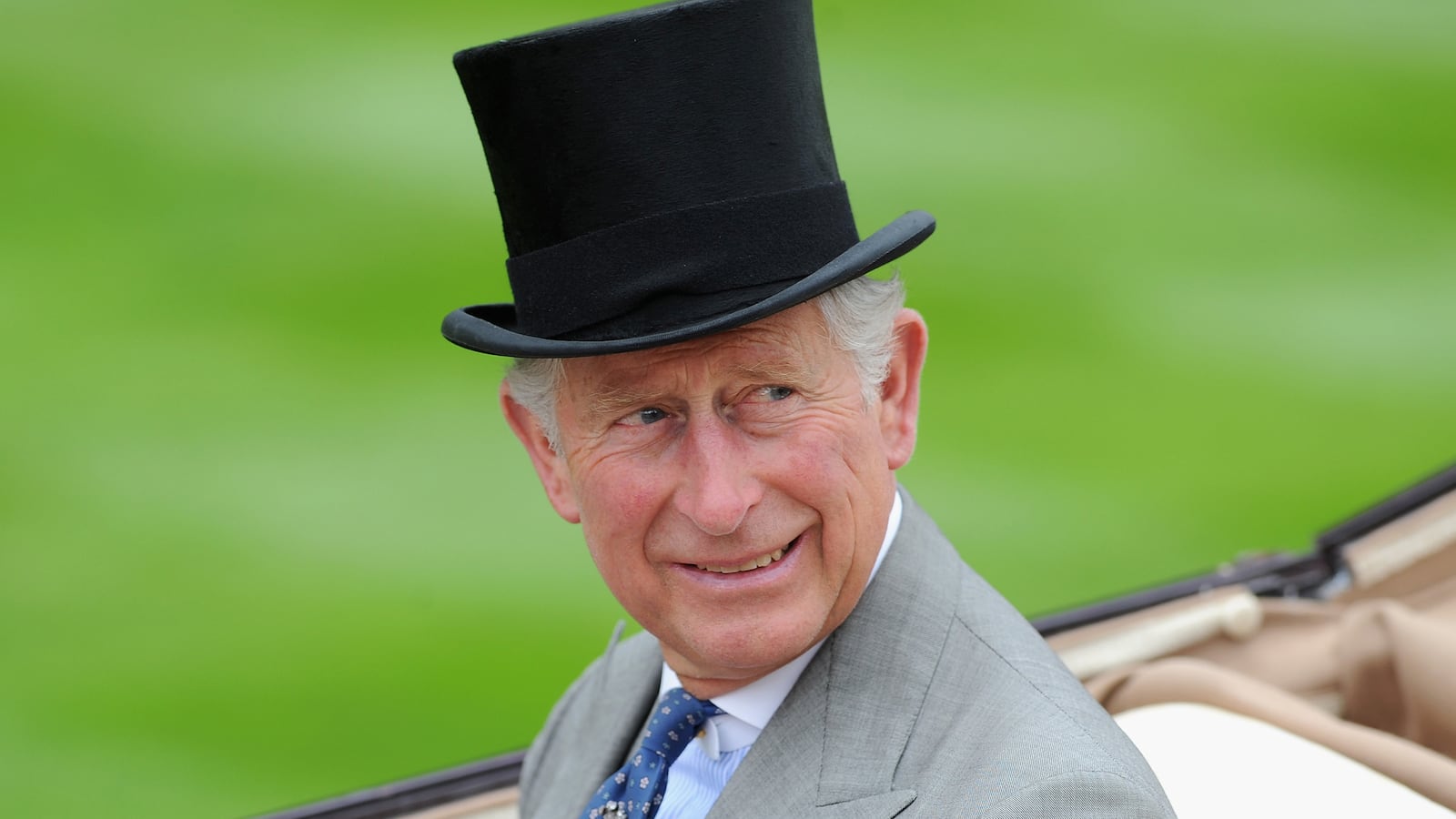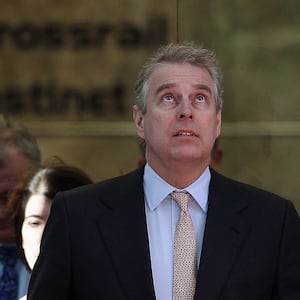If you love The Daily Beast’s royal coverage, then we hope you’ll enjoy The Royalist, an all-new members-only series for Beast Inside. Become a member to get it in your inbox on Sunday.
Buckingham Palace has been decontaminated. Prince Andrew’s office has been closed down. Any chair he sat in has been reupholstered, all doorknobs swabbed down. Let’s not even talk about the bathrooms.
I can’t remember a time when the royal family’s damage control was so swift and absolute. Priests are excommunicated with less haste and more mercy than Andrew in the wake of his disastrous BBC Epstein-related interview, and its ever-cascading fallout. But I detect the odor of scapegoating and hypocrisy in the decisive role that Prince Charles has played in this purge against his brother.
The urgency of Charles’s actions amounted to panic—the kind of panic that suggests that the future King is worried that the whole “firm” is in jeopardy. Nobody wants to lose the Queen but there are distinct signs that the prospect of King Charles IV is far from appealing to many of her subjects.
A recent poll by YouGov found that millennials are cooling toward the monarchy—among 18- to 24-year-olds, only 41 percent are in favor of keeping it.
And one of the things that more and more people are sniffing out about Charles is that he’s a phony—that behind his façade of concern for the future of the planet and talk about slimming down the monarchy, he is an outrageous hypocrite on both counts.
There is persuasive evidence for this in a new book, What the Royal Family Don’t Want You to Know…And What Do You Do? (Biteback Publishing, UK) by Norman Baker, a former government minister and long-time Member of Parliament who has become a zealous auditor of the royal firm’s accounts and travel habits.
Among the red flags that Baker raises are:
- Charles has turned his vast personal fief, the Duchy of Cornwall, into a brand of high-end supermarket foods that makes an annual profit of more than £21 million ($27.1 million) on which he pays no corporate taxes.
- Although he pays income tax (albeit “voluntarily”) he is allowed to make huge deductions for expenses including the costs of a personal staff of 28, including butlers, valets and gardeners—as well as those of the Duchess of Cornwall, Camilla, including her jewels, clothes and stabling for horses.
- He pays market price rent to the Duchy on Highgrove, his sprawling country estate, but all that money comes straight back to him in the Duchy’s profits without any deductions for tax—amounting, in fact, to self-dealing.
- The Duchy audits its own accounts and gives no right of access to the government watchdog, the National Audit Office.
- When Charles made a tour of Europe to promote awareness of climate change he flew to Rome, Berlin and Venice on a private jet, leaving a carbon footprint of 52.95 tonnes—using commercial flights would have reduced emissions by 95 percent.
- The latest available annual travel costs (2018/19) for Charles and Camilla were £1.3 million ($1.68 million) and in that one year the carbon emissions generated by travel by the whole royal family doubled to 3,344 tonnes.
The Daily Beast reached out to Buckingham Palace for comment, and did not receive a response.
What makes Baker’s book particularly unusual is that he is currently a member of the Privy Council, the body of the “great and the wise” appointed as advisers to the Queen.
The title Duke of Cornwall is a lesser of Charles’s titles, Prince of Wales being the principal. But there is no loot with the Welsh title, nor much involvement with Wales except being invested with the title at an empty medieval pile, Caenarvon Castle, for which it is required to learn a few perfunctory lines of Welsh.
In contrast, the Duchy of Cornwall is loaded with wealth and land holdings that go back to 1337. Only 13 percent of the land is in Cornwall; there is four times as much in neighboring Devon, including 160 miles of coastline, and some hugely valuable sites in London.
The idea of using the Duchy name to brand a line of foods began in 1992 by using organic cereals from Duchy farms to make a line of biscuits named “Duchy Originals” – thereby seeming to be consistent with Charles’s well publicized devotion to the purity of organic products.
However, along with the world economy, the business crashed in 2008, making a loss of £3.3 million ($4.26 million). Charles was bailed out by the Waitrose supermarket chain, which saw an opportunity to punch the brand back into life by making it like a combination of Whole Foods and a royal franchise—all Duchy products carry the Duchy’s coat of arms as their logo.
Very few of the products contain ingredients from the Duchy farms, but that doesn’t matter any more. Charles and Camilla occasionally turn up at a Waitrose branch to promote a new line, and the power of the royal endorsement has built a fortune for them.
Baker skewers the cover that Charles pays a 40 percent income tax rate on his income from the Duchy by pointing out that in one year, 2012, when the profit was £18.3 million ($23.63 million), he deducted more than £7 million ($9.04 million) as expenses. Also, the Duchy is exempt from capital gains tax and inheritance tax.
Indeed, the royal family has obviously had some good tax advice. When Elizabeth the Queen Mother died in 2002 her estate avoided death duties because her most valuable personal possessions, mostly jewels, had been passed to her grandchildren nine years earlier. After her death the jewels were found still stashed away in her home—but the tax man allowed the dodge.
The family is also very adept at concealing the frequent excesses of its travel habits. Twenty years ago all trips that cost more than £500 ($646) had to be publicly disclosed. By 2010 the threshold was £10,000 ($13,000) and by 2016 £15,000 ($19.4 million). Baker says that allowed 202 helicopter flights to go unlisted in that year, as well as 43 charter flights.
Prince Harry seems to have caught this habit. In 2018 he chartered a private jet for a short round-trip flight to Amsterdam at a cost of £20,000 ($26,000), and in 2019 he spent the same amount on a one-way flight home from Norway so that he could be with Meghan on St. Valentine’s Day.
There is a history of British lawmakers trying to tear away the veil of secrecy surrounding the royal finances and not getting very far.
One of the most dogged was a Scottish member of the Labour Party, Willie Hamilton, who for the first 30 years of the Queen’s reign bore down on every aspect of her family’s accounts as far as he was able. In the 1970s, when Princess Margaret was at her most debauched, he called her “this expensive kept woman.” But his most scathing assaults were on the costs of providing the family with the royal yacht, Britannia.
In 1961 he discovered that the cost of running the yacht was £330,000 (then around $926,000) a year, even though it had been used for only 337 days in five years. He set this against the fact that at that time millions of Britons had an income of less than £10 (then around $28) a week.
But Britannia was not sunk by Hamilton. She sailed on until 1997 when Tony Blair came to power and carried out a Labour party pledge that she should be decommissioned. Her final assignment was to bring back Prince Charles from Hong Kong after he presided over the ceremony handing back control of the colony to China. At the decommissioning ceremony the Queen was teary-eyed.
The royal train, however, still trundles over the British railway network, used for commuting between palaces. The cars, including sleepers, a dining car and several lounges, date from the late 1970s and have the retro-luxe look of the Orient Express. Most trips cost over £15,000 ($19,000) but since the Queen and Prince Philip are no longer jet setters they are more comfortable at this speed than in any other form of locomotion.
Charles becomes very testy when it is suggested that there should be more transparency about his finances. In 2005, after a government watchdog said of the Duchy’s accounts “More information and explanation need to be given to readers of the accounts, not the least of which is Parliament” he snapped that the report was “a travesty” and “fundamentally wrong.”
And, forewarning about his attitude to becoming King he said, “I think it of absolute importance that the monarch should have a degree of financial independence from the state… I am not prepared to take on the position of sovereign on any other basis.”
Charles has an overweening sense of privilege and entitlement, born of many years of being pampered with a level of personal service and comfort that have securely insulated him from the realities of normal life. He also has annoying habit, as The Economist recently noted, of “sounding off about a wide range of subjects about which he has more opinions than knowledge.”
Nonetheless, compared to Andrew he is a lily-white innocent. Andrew has reached a level of shameless moral turpitude unseen in any other modern prince. For years he and Fergie—an ex who remains not so ex—have behaved like a couple of well-practiced grifters, offering his title in pay-for-play deals to anyone still in awe of the aura of the monarchy. They were able together to buy a $19 million Swiss skiing chalet on the proceeds.
Now, as far as Andrew is concerned, that aura is now without value. But the sleaze had gone on too long without reproof from the royal family. They are scrambling to save themselves from the toxic fallout and are more vulnerable than they have ever been to the kind of hard-nosed scrutiny that Baker has delivered.
From his experience as a minister Baker was able to see the largely hidden collateral expenses of supporting the family from the public purse, particularly the cost of security to cover every member of the family, even the most peripheral ones. He puts the true cost at “well beyond £300 million ($387 million) a year.”
The Queen has a net worth of around £20 billion (around $26 billion). This is able to accumulate partly because there is no inheritance tax on bequests from monarch to monarch. The Queen is believed to have received a tax-free bequest from her mother’s estate of between £20 and £25 million ($26 and $32 million). Royal wills are never published and no government has wanted to change that.
Over the past quarter-century support for the monarchy has remained between 65 to 80 percent and YouGov puts the Queen’s current popularity rating at a healthy 73 percent.
Her greatest asset has always been that nobody outside the family really knows who she is. She is one of the most famous people in the world and yet relatively unknowable. This is a very smart way of remaining above reproach.
The same can’t be said for her heir. The more we get to know about him the more obvious it becomes that he has no way of attaining the popularity of his mother. He will be the next king, but he also might be the last.







